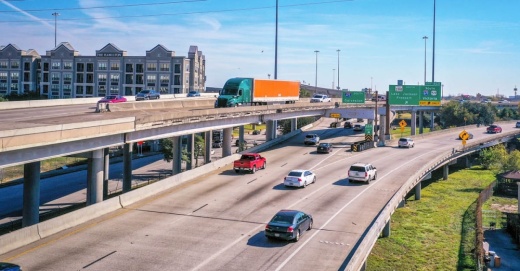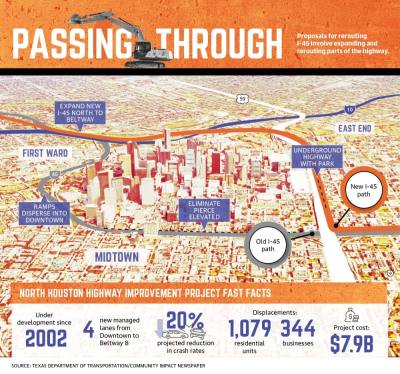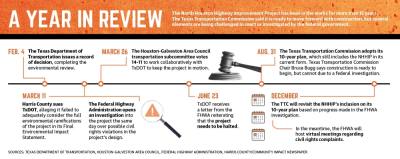Known as the North Houston Highway Improvement Project, the effort has been under development by TxDOT since 2002. Officials with the Texas Transportation Commission—the five-member group governing TxDOT—said they are ready to move forward with construction, but an ongoing investigation by the Federal Highway Administration has forced the agency to hold off. The FHWA is a division of the U.S. Department of Transportation that oversees highway construction.
“It’s crystal clear to me TxDOT is ready to build the NHHIP, no question about it,” Texas Transportation Commission Chair Bruce Bugg said at an Aug. 31 meeting. “But we can’t do it until the [Federal Highway Administration] releases the hold.”
The investigation, which was launched in March and looks into whether the project violates the civil rights of nearby residents, was spurred by public input, according to the FHWA. It comes amid other forms of opposition that have slowed the project down, including a lawsuit filed by Harris County in March alleging TxDOT failed to adequately consider environmental ramifications.
The project has also earned supporters, including those who say it will reduce congestion, improve safety and boost the economy. But opposition groups—like Stop TxDOT I-45, which has slammed TxDOT for disregarding affected communities in the design of the project—have been growing in the wake of civil rights conversations.
“Resistance is only going to build,” said Molly Cook, an organizer with Stop TxDOT I-45. “There’s an influx of new faces because of all the news ... but also because they see we are fighting for the right thing.”
Project background
The NHHIP involves adding four managed express lanes on I-45 from Downtown Houston to Beltway 8 North. It would also reroute I-45 to be parallel with I-10 on the north side of Downtown and west of Hwy. 59. It would then run parallel to Hwy. 59, south of I-10 and on the east side of Downtown until it reaches the existing I-45 and Hwy. 59 crossing.
The $7.9 billion project also includes the addition of bicycle and pedestrian areas, and sidewalks along frontage roads, according to TxDOT. In addition, a stretch of the existing I-45 known as the Pierce Elevated, which runs south of Downtown between Louisiana Avenue and Highway 59, would be removed.
Several of the segments of I-45 that would be expanded rank among the state’s most congested roadways compiled each year by the Texas A&M Transportation Institute. The 10-mile segment between Beltway 8 and Loop 610 ranked as the No. 15 most congested road in 2020, while the segment from Loop 610 to I-10 ranked No. 17.
The Greater Houston Partnership, which supports the project, estimates traffic volumes along I-45 will increase by 40% by 2040.
“We believe the project offers an unprecedented opportunity to improve Houston’s transportation safety and mobility, and we appreciate TxDOT’s continued investment in the Houston region,” GHP President Bob Harvey said in an Aug. 31 statement.
In a September 2020 Final Environmental Impact Statement—which seeks to determine how construction will affect the surrounding area—TxDOT said the project would displace more than 1,000 residential units, 344 businesses, five places of worship and two schools. TxDOT also said the project would improve air quality, though critics contest those claims.
In its lawsuit, Harris County alleges TxDOT failed to disclose the climate impacts of the project. In a statement released in response to the lawsuit, TxDOT officials said they looked forward to continue to work with stakeholders to mitigate their concerns about the project.
Though some funding has been set aside to help affected residents relocate, opponents said the consequences of the displacements would be largely felt in Black and Hispanic communities.
“The design as it stands currently is so harmful and so devastating,” Cook said.
Several groups have called on TxDOT to rework the plan’s design. Among them is Houston Mayor Sylvester Turner, who proposed an alternative to TxDOT in December that would use a narrower footprint and expand public transit options. Others have called for freeway removal, a concept that would involve beefing up public transit, revamping the bike system, rerouting freight and encouraging people to drive less.
In its investigation, the FHWA will look at how the project is expected to affect surrounding communities—including displacement and air quality—and then look at the demographics of who will be affected, said Alex Kerner, a professor with the Austin School of Architecture who studies equity in transportation construction.
After that, investigators will compare how the demographics of those affected compare to the county overall to determine if a “disparate impact” is apparent, Kerner said. TxDOT will then have an opportunity to explain any apparent discrimination and could potentially offer concessions that would address concerns. However, how much the investigation changes the project remains to be seen, Kerner said.
“The [FHWA] can put pressure on an agency to modify their alternative, but at the end of the day, the agency can still largely do what it wants ... as long as their response is not arbitrary and capricious,” he said.
Next steps
Despite the investigation, TxDOT opted to keep the NHHIP in its 10-year plan during a vote that took place Aug. 31. TxDOT’s 10-year plan is required by state law to be updated annually.
Bugg said the Texas Transportation Commission would revisit the I-45 project and the status of the federal investigation at its December meeting to determine what should be done next. Citing the need to be responsible with taxpayer money, Bugg said a lack of progress in the investigation could compel the commission to revisit the project.
FHWA investigators were slated to come to Houston the week of Sept. 13 to begin meeting with residents affected by the project, but the site visit was postponed because of the coronavirus pandemic, FHWA officials said.
“FHWA is continuing to hold virtual meetings regarding Title VI complaints related to the I-45 North Houston Project,” the administration said in an email statement to Community Impact Newspaper. “Although FHWA staff have postponed travel to Houston due to COVID-19 concerns, the virtual meetings are helping FHWA in continuing our comprehensive investigation.”
Conversations have continued over what should be done moving forward. In a Sept. 3 statement, members of the Houston-Galveston Area Council affirmed their support of the project, but also said they understood the concerns of opposition groups.
“There are still clear challenges surrounding this project that we must overcome,” officials wrote in the statement. “However, rather than being viewed as reasons to stop the project entirely, these challenges should be thought of as opportunities for stronger engagement and more dedicated collaboration between all the parties with an interest in the development and improvement of this corridor.”
Cook said the promises from groups like TxDOT about incorporating public feedback and working more closely with opposition groups have not come to fruition.
An online survey hosted by TxDOT in August found 5,529 people in support of the project, 2,555 people wanting it removed and 86 people who supported project funding but were against building it as proposed.
Supporters cited those survey results to argue the project should continue. However, opponents said the survey was flawed, arguing TxDOT did not do enough to garner feedback from those who would be directly affected and that the survey only being available online skewed who participated. Others said the survey did not provide participants with the full range of choices.
“This engagement process missed a third option: support maintaining funding but redesigning the project to better respond to community input,” said Jonathan Brooks, director of policy and planning with the transportation advocacy group LINK Houston, speaking at the Aug. 31 Texas Transportation Commission meeting.
Although Cook said she was disappointed by the Aug. 31 vote, she said opposition groups have remained diligent in trying to get the word out. At a Sept. 12 Stop TxDOT I-45 door-knocking event in Kelly Villages—a community in Houston’s Fifth Ward that would be affected by the project—many of the door knockers were volunteering for the first time.
First-time volunteer Daniel Angel said many of the people he spoke with that day were eager to learn more or get the latest update.
“It seems like people are just becoming more engaged with all this on every level,” Angel said.








